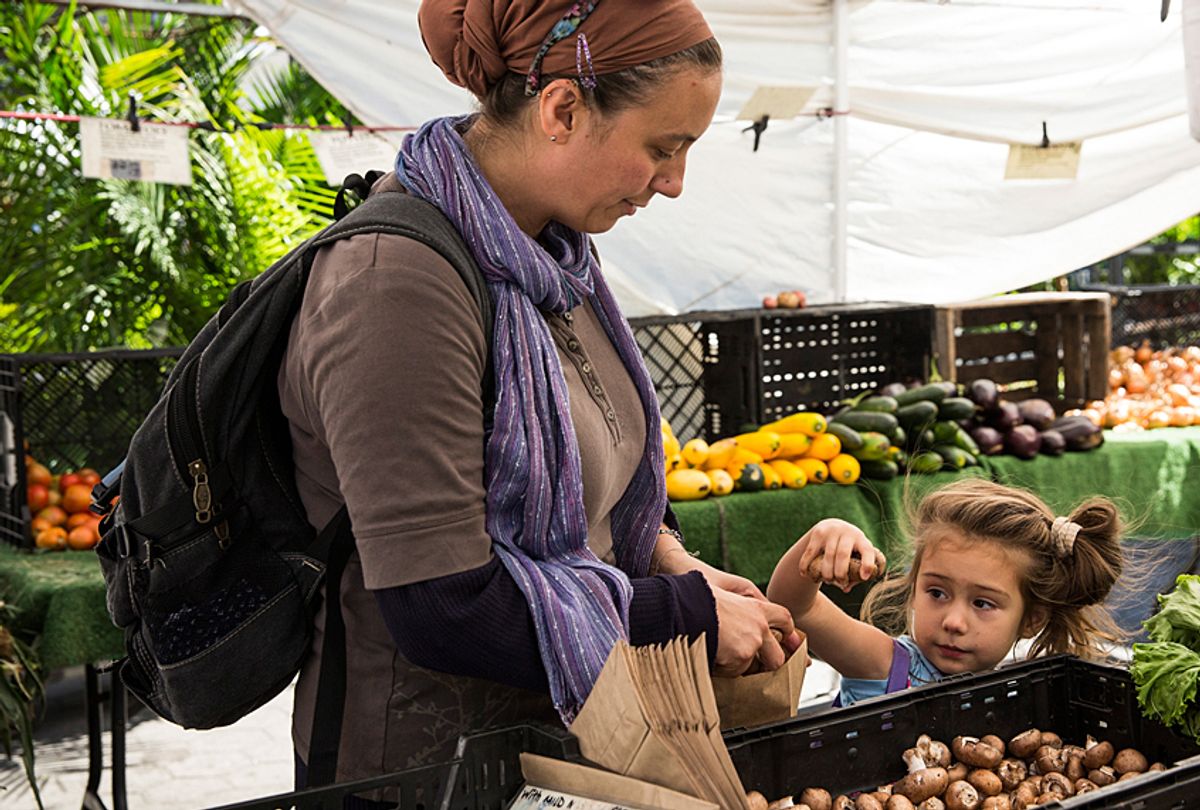Donald Trump's administration may be incompetent when it comes to governance, but it's aces when it comes to unparalleled corruption and trolling. Both were in play with the dramatic announcement that the proposed 2019 budget would take half the budget for low-income Americans' food stamp benefits (technically the Supplemental Nutrition Assistance Program, or SNAP) and use them to send boxes of pantry staples to participants, instead of allowing them to shop for themselves.
It's almost a given that this was likely a corrupt move to shift money from low-income people toward graft-heavy private contract programs, but it's also likely that Trump and his budget director, Mick Mulvaney, were just trolling. Mulvaney compared his idea to "Blue Apron," planting the false idea in vulnerable minds that food stamps are being used on gourmet, ready-to-cook meals, an obvious gambit to fuel right-wing resentment of the poor.
But it was also an effort to bait liberals. Shawn Fremstad of the Center for American Progress suggested that the debate over how much freedom of choice poor people deserve may be a "red herring to distract from the other very large cuts to SNAP that they’re proposing" — cuts that are far more likely to pass.
Instead of taking the bait, progressives should use this as an opportunity to talk not about hypothetical boxes and what would go in them but about genuine ways to improve SNAP so that the goals it's supposed to serve — feeding poor people and improving their economic prospects — are met more effectively and efficiently.
The first thing to understand, argued Stacy Dean of the Center on Budget and Policy Priorities, is that SNAP is "pretty successful now," not just because it provides short-term hunger relief, but also because of the program's "long-term consequences on health, education and employment." Research shows that investment in SNAP lowers health care costs, stimulates economic growth, improves children's educational outcomes and leads to better long-term employment prospects.
But as with any social safety net program that has weathered many rounds of "small government" erosion, SNAP could be a lot better. Perhaps the most important fix would be to increase the amount of money people get in the program.
"Professors Patricia Anderson (Dartmouth) and Kristin Butcher (Wellesley) found that a $30 increase in monthly SNAP benefits would increase participants’ consumption of nutritious foods such as vegetables and healthy proteins, while reducing food insecurity and consumption of fast food," writes Lauren Bauer at the Brookings Institution.
By contrast, said Dean, the box idea risks taking "purchasing power away from healthy, fresh foods."
Both Dean and Fremstad also argued that the program needs to be expanded so more people are eligible. "I think the three-month time limit that affects childless adults remains an incredibly harsh policy and punishes people for periods on unemployment," Dean said.
“You can do everything you can to search for a job," Fremstad said, but still be cut off after three months. If you find a part-time job that's not sufficient to pay rent and feed your family, you can still be cut off the program.
Instead of time limits or onerous work requirements, Dean suggested that job training programs tied to SNAP would be more efficient and effective at helping people lift themselves out of poverty.
Fremstad also argued that with the surge of "working-class students" and people returning to school after years in the work force, "restrictive rules in the program that limit access for adults who are in community college, or in regular college" are outdated. Opening the program up to students could do a lot to help more people get the skills required for jobs that pay a living wage.
As for the program itself, there are a multitude of ways to make it work better for recipients. Fremstad described Trump's box idea as "silly," but said many SNAP recipients "could benefit from having the ability to go online [and] order some deliveries, whether it be from Amazon or Target or their local grocery store." Some pilot programs have been started along those lines, although they are still restrictive in ways that may create access problems. Most SNAP enrollees who can work already do so, and could use the time-saving benefits of online shopping.
More could also be done, Dean argued, to make sure that pregnant women, infants and toddlers who receive SNAP benefits are also enrolled in Women, Infants and Children (WIC), "which offers a supplemental food box, as well as nutritional counseling and health screening" and is automatically available to any pregnant women or small children who are SNAP-eligible. Getting some food from WIC — which provides fruit and vegetables, cereal, bread and other items — can free up SNAP money for families to spend on other fresh food at the grocery store.
While SNAP is fairly successful on its own, Fremstad said that he would still prefer "a social assistance program like other countries [have], where you get money that you can use for shelter, for food, for other basic necessities -- kind of a guaranteed basic income but tied to means-testing." Programs like that would offer the flexibility to help families meet their individual needs more effectively. As Fremstad noted with a laugh, it's hard to imagine such a program ever happening, given current political realities.
The grim truth, and the reason why Trump's "box" troll was so effective, is that large swaths of the American population still see poverty as a moral failing and believe that people who need assistance cannot be trusted to handle basic adult responsibilities like paying rent or choosing food to feed their families. That also makes it difficult to have a rational discussion about policies that would actually help people out of poverty. Too many Americans are more interested in humiliating and punishing low-income people than in figuring out how best to alleviate their suffering and help them thrive.



Shares